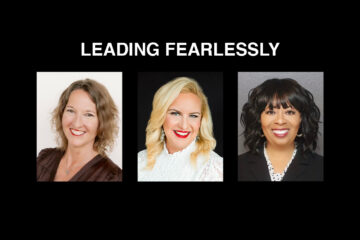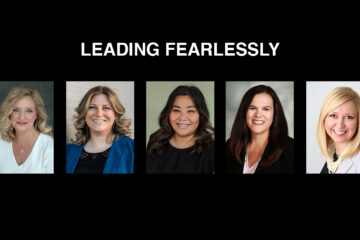By Nicole Grundmeier
After studying sociology in Mexico, Blanca Plascencia came to the United States to pursue the American dream – but she found herself busing tables, cleaning toilets and rarely seeing her children.
She worked at a restaurant from 10 a.m. to 10 p.m.
“More than half of the tips that I was making was going to the babysitter. My kids were raised by babysitters. It was not the American dream that I was hoping to live,” Plascencia said.
Plascencia and five other women shared lessons about adversity and leadership on Tuesday afternoon at Tina Talks in West Des Moines. The program is organized by the West Des Moines Chamber of Commerce. This year’s theme was #LeadHERship.
Plascencia told the crowd of women that her marriage fell apart during those early years in the United States: “Cuando la pobreza entra por la puerta, el amor escapa por la ventana” – When poverty walks through the door, love escapes through the window.
“That’s what happened to me,” Plascencia said. “I didn’t live the American dream that I was hoping to live. I left my home, my family, my language, everything that I knew. I left it to come here to give my kids a better opportunity, to give them a better life, and it wasn’t happening. So I just was questioning myself: What am I doing wrong?”
Her path changed when a co-worker told her he was leaving for Minnesota to open his own restaurant. His entrepreneurship sparked something in Plascencia. She was inspired to do the same.
On July 8, 2017, Plascencia and her new husband opened El Fogón Mexican Grill in West Des Moines. In 2022, Plascencia was Iowa State University’s Ivy College of Business Woman Business Owner of the Year. The same year, she was named the Iowa Restaurant Association’s American Dream Award winner.
Here are some highlights from the other five women’s speeches at Tina Talks:
Perlla Deluca, owner and CEO of Southeast Constructors Inc.
Perlla Deluca grew up in Brazil, where her family didn’t have a lot of money. Her father was able to get her into a school “through charity,” where she felt different from other students.
When Deluca was 14, she came to a conclusion that would have lifetime implications.
“I wasn’t going to let other people talk me down just because I didn’t have things, or I didn’t look good. So I decided, you know what, I’m going to write down everything that I’m good at, and I’m going to take that through life. And I’m going to make my own decision about who I am.”
Deluca immigrated to the U.S. at age 20 and started working for a small construction company in Florida. Eventually she became a general contractor. She is passionate about construction, especially women in construction. Deluca is the co-founder of the Iowa School of Construction.
“I think for people that don’t have an opportunity to go to college, like myself, I think it’s an amazing opportunity to start a career in construction,” she said.
Deluca’s career has included 26 federal projects, including the restoration of a house that belonged to former President Harry S. Truman and the Iowa Women of Achievement bridge.
Angela Walker Franklin, president and CEO of Des Moines University
Angela Walker Franklin grew up in McCormick, S.C., the youngest of two daughters of a teacher and a successful businessman who owned funeral homes.
From an early age, she felt pressure to excel academically.
“Imposter syndrome is a real thing. And a lot of times, the voices and the messages that we give our kids coming up is what actually defines that, so that later in life, we’re often doubting: Can I do it? What do I need to do to achieve? Can I be successful?”
The expectations intensified when she was part of a last wave of students to integrate schools in Jim Crow South Carolina, where she was the only Black child in her fourth grade classroom.
“Not only being forced to be one of the first, but to have this backdrop of, ‘You go there and you still achieve.’ So the pressure that comes with not only the expectation of family, but everyone’s eyes on you now, to see if you’re going to sink or swim. That created a sort of a tough exterior – the sense that I’m expected to achieve, and there’s a lot of opposition out there to keep me from being able to do that.”
In college, she studied psychology. Her moments of self-doubt persisted, even as she climbed the career ladder and became a university president.
“As I was being considered to come to Des Moines University, I really doubted that they’d ever hire me. As an African American woman, there was a sense that, ‘Oh they’re just diversifying their list. They just want to have a pool of candidates that are more diverse. They’re likely not going to hire me.’ What I didn’t know is they were looking for someone just like me.”
Franklin was hired as Des Moines University’s 15th president. She has spearheaded the university’s Purple & Proud campaign to raise $50 million, which the school says will help take DMU’s physical campus to West Des Moines and result in expanded programming.
Rosemary Parson, senior vice president of administrations and community relations at EquiTrust Life Insurance Co.
When Rosemary Parson was a child, she wanted to carry a briefcase and sit at a corporate board table.
She knew she wanted to be a leader. But she didn’t know what would be inside her briefcase. The corporate board table was just something she saw on television.
But she knew she wanted a seat at that table.
“The problem … is that I look like this. That was a problem. I was female. I was Black, from the inner city, and none of those things said, ‘finance,’ ‘insurance.’ None of those things said, ‘division,’ ‘business,’ none of those things. But I had to figure out how to harness the brand of me and make that work.”
She knew she had to figure out what was important to a particular business – and demonstrate what she knew about leadership. She had to show that she was on a journey to understand the securities world. She had to show she could read a financial statement and grasp exactly how an organization made money.
“But what did that have to do with me? A lot of people can do that. I knew I had to build a brand portfolio,” Parson said.
She knew she had to build a brand portfolio, which is different from a resume – it’s more than what a person has done, what a person has achieved, where a person went to school, she said.
“But your brand portfolio, your me portfolio, that says, ‘This is who I am. This is what I can bring to the table.’ And this is what, without a doubt, I will be able to demonstrate my values with. I will be able to demonstrate how I can differentiate myself from the next.”
Parson was inducted into the Iowa Insurance Hall of Fame in 2021. She recently started a nonprofit organization, Obesity Awareness in Action, with her daughter.
Claudia Schabel, president and CEO of Schabel Solutions
From the moment of her birth, Claudia Schabel had a follower – her twin sister, Carla.
“Since a very early age, I was always compared, always asked, who leads who? So I was introduced to this concept of leadership early on: Are you the leader? Are you the leader? And that concept never really crystallized to me when I was a young person. Often, I thought of leadership in a different way,” she said.
Schabel discussed key moments in her life where the meaning of leadership became defined.
The twins grew up during a 21-year military dictatorship in Brazil. She typically overheard adults talk about leadership in terms of what happened with the armed forces and, more brightly, what happened on the soccer field.
“So we never explored that concept well. So when I think about leadership, I realize that my parents were the first leaders and the ones that mattered the most in my life. They were able to navigate the culture, navigate the struggles of living in a developing country at the time, and show me the way to really never give up.”
Her mother was a single mom, then married a man Schabel mindfully calls her father – not her stepfather. Her father taught her to dream big. “He also instilled in us the love for education, and that still inspires me today as I make my own personal decisions,” Schabel said.
She watched her parents face many obstacles. They were in an interracial marriage, which was uncommon in Brazil at the time. They faced unemployment and financial situations that aggravated their home life.
“So the lessons that I learned growing up in Brazil were really around ‘How do we continue to learn, no matter what’s happening around us?’ The second lesson is being adaptable and flexible.”
Schabel’s family moved to Japan when she and her twin sister were 17 years old. For five years, Schabel worked in a factory six days a week, 10 to 12 hours a day. The family’s goals: work hard, save money, return to Brazil.
But that didn’t happen. Schabel met her husband, Brad Schabel, while ice skating in Japan. Instead of ending up in Brazil, Claudia Schabel ended up in Des Moines. She attended school at Des Moines Area Community College, then Drake University.
She is president and CEO of Schabel Solutions, a full-service DEI consulting company. Schabel was a leader on the city of Des Moines’ Civil and Human Rights Commission.
Connie Wimer, owner and chairman of Business Publications Corp.
Connie Wimer wants women to know that it’s never too late.
“I have women in their late 30s, 40s and 50s coming to me saying, ‘Oh, I wish I would have,’ or ‘I would,’ ‘I could.’ It’s never too late,” Wimer said, adding she had the perfect example.
The Business Record will be 40 years old this year.
“When I started the Business Record – a lot of you know this in the room, but some of you will be surprised – I was 50 years old when I started the Business Record. So it is never too late. If you have a dream, pursue that dream,” Wimer said.
She emphasized that women need to learn how to do two things very well – two areas where they often lag behind their male peers.
The first skill is learning how to negotiate.
“It makes such a difference in your life, and if you think about it, your life is filled with negotiations whether with your children, your teachers, your spouse or your partner. You’re constantly negotiating, so get comfortable with it, get good at it, and recognize that a good negotiation doesn’t have a winner and a loser. It has two winners. Both sides get something they would not have gotten otherwise,” Wimer said.
The second skill is learning how to take risks.
“You have to take risks and you have to face fear,” Wimer said, noting that learning from failure and accepting failure is part of that.
“You know, in my later years, people frequently say, ‘Oh, everything you touch turns to gold.’ That is certainly not the case. I have made so many mistakes and had failures. But I look at failure as another way of learning. And if you persevere, you’ve learned something, you can do it better the second time or the third time, however long it takes,” Wimer said.


